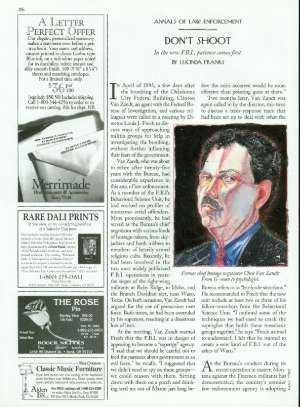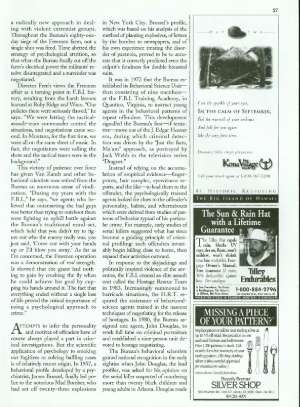The New Yorker, July 22, 1996 P. 26
ANNALS OF LAW ENFORCEMENT about Clint Van Zandt. Clint Van Zandt is a former chief hostage negotiator and member of the F.B.I.'s Behavioral Science Unit. He has worked on numerous cases, including the Weaver family at Ruby Ridge, the Waco Branch Davidian compound, the Oklahoma City bombing, the Unabomber suspect Theodore J. Kaczynski, and, most recently, the Freemen in Montana. F.B.I. Director Freeh views the Freemen affair, where the F.B.I. used negotiation to wait out the anti-government group and no life was lost, as a turning point in F.B.I. history, resulting from the harsh lessons at Ruby Ridge, and Waco: "...the negotiators were calling the shots and the tactical teams were in the background." This victory of patience over force was inspiring to Van Zandt and many other behavioral scientists. The F.B.I.'s Behavioral Science Unit was established in 1972; the psychologically trained agents looked for clues about a suspect which were derived from studies of patterns of behavior typical of his particular crime. The F.B.I.'s Hostage Rescue Team, created in 1983, utilized the behavioral scientists in negotiating for the release of hostages; John Douglas was their lead profiler. The F.B.I. establishment looked on behavioral scientists with skepticism, and their recommendations were not always taken. Douglas created a profile of the Unabomber that was surprisingly accurate, but it was ignored in favor of the F.B.I.'s more traditional viewpoint. Van Zandt is 50, and he retired from the F.B.I. in August, 1995. No agent's career has been more emblematic of the F.B.I.'s evolution into a psychologically sophistocated intelligence agency. In 1979 he became a born-again Christian. In 1984, he joined the H.R.T. Van Zandt tried to convince the F.B.I.'s tactical agents not to use force at Ruby Ridge against the Weaver family, but was ignored; disgusted with the outcome there, he transferred in October of 1992 to the Behavioral Science Unit. Van Zandt analysed David Koresh as a psychotic at Waco, and the violent outcome there disturbed him as well. Van Zandt recommended to F.B.I. director Freeh that he use third-party negotiators who were anti-government. Today, behavioral scientists are a respected part of the F.B.I., and negotiators are sometimes given equal status with the SWAT teams.

